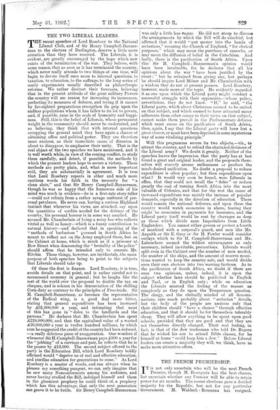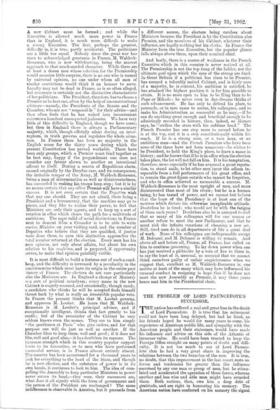THE FRENCH PREMIERSHIP.
IT is not only uncertain who will be the next French Premier, though M. Bourgeois has the best chance, but uncertain whether any Premier will be able to retain power for six months. The recent elections gave a decided majority for the Republic, but not for any particular Government. M. Waldeck - Rousseau has resigned. A new Cabinet must be formed ; and while . the Executive is allowed much more power in France than in England, it is much more difficult to make a strong Executive. The first, perhaps the greatest, difficulty is, it is true, partly accidental. The politicians are a little too equal. Nobody since the great war has risen to acknowledged greatness in France, M. Waldeck- Rousseau, who is now withdrawing, being the nearest approach to that much-needed character. While there are at least a dozen men whose selection for the Premiership would occasion little surprise, there is no one who is named by universal opinion, no one under whom all men of similar convictions would think it an honour to serve. Loyalty may not be dead in France, as is so often alleged, but reverence is certainly not the distinctive characteristic of her politicians. The President, therefore, has to choose a Premier as he best can, often by the help of unconstitutional advisers—namely, the Presidents of the Senate and the Chamber, who are not " responsiLle " for their advice—and then often finds that he has waked into inconvenient existence a hundred unsuspected jealousies. We have very little of this difficulty in England, though we have some; but then in England there is always a Parliamentary majority, which, though officially silent during an inter- regnum, in truth governs and regulates the whole situa- tion. In France there . has b3en no majority in the English sense for the thirty years during which the present Constitution has proved workable. There have been only groups, which a Premier must bind together as he best may, happy if the preponderant one does not consider any favour shown to .another an intentional affront to itself. During a season of Republican alarm, caused originally by the Dreyfus case, and its consequence, the irritable temper of the Army, M. Waldeck-Rousseau, being a luau of determination as well as disinterestedness, has succeeded in making his troops keep step ; but it is by no means certain that any other Premier will have a similar success. It is not even certain that the Deputies wish that any one should. They are not afraid, there being a President and a bureaucracy, that the machine may go to pieces, and they like to realise their power, to feel that Ministers are only their agents, and to keep up a sort of rotation in office which clears the path for a multitude of ambitions. The most valid of social distinctions in France next to descent from a Crusader is to be able to write ancien, Minislre on your visiting card, and the number of Deputies who believe that they are qualified, if justice were done them, to earn this distinction approaches the total number returned at the election. Every man has his own opinion, not only about affairs, but about his own relation to his confreres, and is prepared, if opportunity serves, to make that opinion painfully visible.
It is most difficult to build a fortress out of such a sand- heap, and the difficulty is increased by a peculiarity in the constituencies which must have its origin in the entire past History of France. The electors do not care particularly who the Ministers are. In England a change of Ministry Is a sort of political cataclysm ; every name in the new Cabinet is eagerly scanned, and occasionally, though rarely, a candidate who thinks he will be accepted finds himself thrust back by what is really an irresistible popular veto. In France the peasant thinks that M. Loubet governs, and approves M. Loubet. He hears that M. Waldeck- Rousseau is M. Loubet's principal adviser, and if exceptionally intelligent, thinks that fact greatly to his credit; but of the remainder of the Cabinet he very seldom knows even the names. They are to him simply " the gentlemen at Paris " who give orders, and for that purpose one will do just as well as another. If the Chamber likes to keep them, well and good ; if it does not like, well and good also,—it has doubtless its reasons. The immense strength which in this country popular support lends to its favourites, or to men who have performed successful service, is in France almost entirely absent. The country has been accustomed for a thousand years to look for everything to the head of the State, and though he' is now elective, and the substance of power is in its own hands, it continues to look to him. The idea of com- pelling the Assembly to keep particular Ministers in power never enters its head,—they were, their successors are, what does it all signify while the form of government and the person of the President are unchanged ? The same indifference is observable in America, but it proceeds from a different source, _the, electors being careless about Ministers because the President is by the Constitution also Premier, and the members of his Cabinet, whatever their influence, are legally nothing but his clerks. In France the Ministry form the true. Executive, but the popular glance falls always above them, upon their nominal chief.
And lastly, there is a source of weakness in the French Executive which in this country is never noticed at all. The Premiership is not the top rung of the ladder, not the ultimate goal upon which the eyes of the strong are fixed. In Great Britain if a politician has risen to be Premier, has secured a tolerably united Cabinet, and is fairly sure of a majority, he is content, his ambition is satisfied, he has attained the highest position it is for him possible to • attain. It is no more open to him to be King than to be Pope or Mikado ; he never even in day-dreams thinks of such advancement. He has only to defend his place, to persuade, or in rare cases to coerce, his colleagues, and to make his Administration as successful as he may,—if he can do anything great enough and beneficial enough to be admiringly recorded in history, then, indeed, as Horace says, he " strikes the stars with his sublime head." The French Premier has one step more to ascend before he is at the top, and it is a step constitutionally within his reach. If he is a strong man, or a vain man, or an ambitious man—and the French Premiers who have been none of the three have not been numerous—he wishes to be President, to hold the King's place, to leave a name in history ; and he knows that if he is in office when the election takes place, the lot will not fall on him. It is his temptation, therefore, more especially if he has acquired a great reputa- tion, to stand aside, to let other men incur the odium in- separable from a full performance of his great office, and to remain the great figure outside who cannot be forgotten, and who in office achieved so memorable a success. M. Waldeck-Rousseau is the most upright of men, and more disinterested than most of his rivals ; but he is a human being, he has tasted of power, and we cannot but believe that the hope of the Presidency is at least one of the motives which dictate his otherwise inexplicable attitude. Doubtless he is tired ; who would not be with the fatigue of three such years ? Doubtless also he is annoyed to had that so many of his colleagues will for one reason or another refuse to meet the new Parliament, and that he must risk the infinite vexations of choosing a new set. Still, tired men do in all departments of life a great deal of work. None of his colleagues are indispensable except M. Dekass6, and M. Delcass6 is willing to remain. And above all and before all, France, all France, has called on him to continue governing. To lay down power when one has just received a plebiscite by a vote of five to three is, to say the least of it, unusual, so unusual that we cannot think ourselves guilty of unfair suspiciousness when we suggest that, excellent as M. Waldeck-Rousseau is, one motive at least of the many which may have influenced his unusual conduct in resigning is hope that if he does not meet the new Assembly as Premier, it may three years hence seat him in the Presidential chair.











































 Previous page
Previous page